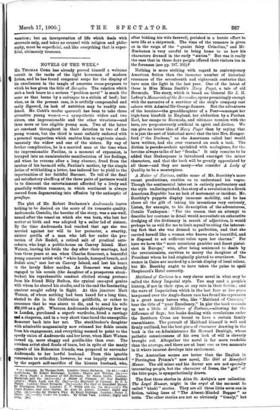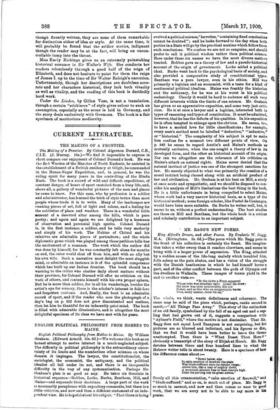NOVELS OF THE WEEK.*
Mn Tnohfas Conn has already proved himself a welcome recruit in the ranks of the light horsemen of modern fiction, and he has found congenial scope for the display of his excellences in the tangle of amorous cross-purposes to which he has given the title of Scruples. The relation which such a book bears to a serious "problem novel" is much the same as that borne by a meringue to a sirloin of beef ; but when, as in the present case, it is artfully compounded and easily digested, its lack of nutrition may be readily con- doned. Mr. Cobb's modus operandi has been to take three attractive young women — a sympathetic widow and two sisters, one impressionable and the other vivacious—and three more or less eligible young men. Two of the latter are constant throughout in their devotion to two of the young women, but the third is most unfairly endowed with a personal magnetism which enables him to captivate simul- taneously the widow and one of the sisters. By way of further complication, he is a married man at the time when the impressionable Pauline, in a moment of expansion, is betrayed into an unmistakable manifestation of her feelings, and when he returns after a long absence, freed from the incubus of his barmaid wife, Panline's mother, by the simple device of withholding a letter, has induced her to yield to the importunities of her faithful Baronet. To tell of the final and satisfactory slinfliing of the three pairs of partners would be to discount the entertainment afforded by a lively and gracefully written romance, in which sentiment is always rescued from degenerating into effusion by the antiseptic of persiflage.
The plot of Mr. Robert Buchanan's Andromeda leaves nothing to be desired on the score of its romantic quality. Andromeda Costello, the heroine of the story, was a sea-waif, named after the vessel on which she was born, who lost her mother at birth and was adopted by a sailor lad of sixteen. By the time Andromeda had reached that age she was married against her will to her protector, a swarthy, sinister gorilla of a man who left her under the pro- tection of Job Endell, a retired salt of piratical ante- cedents, who kept a public-house on Canvey Island. Matt Watson, leaving his bride the day after their marriage, had been three years at sea when Charles Somerset, a beautiful young amateur artist with " white hands, honeyed breath, and dudish airs," met her on Canvey Island, and lost his heart to the lovely fisher maiden. As Somerset was already engaged to his cousin (the daughter of a prosperous stock- broker) his reprehensible conduct elicited strong protests from his friend Billy Baton, the cynical one-eyed genius with whom he shared his studio, and in the end the fascinating amateur sought safety in flight. At this juncture Matt Watson, of whom nothing had been heard for a long time, elected to die in the Californian goldfields, or rather to announce that he was about to die, and to send his wife 220,000 as a gift. Whereon Andromeda straightway flew up to London, purchased a superb wardrobe, hired a carriage sad a chaperon, and in a very short time lured the susceptible Somerset back into her net. The stockbroker's daughter with admirable magnanimity now released her fickle cousin from his engagement, and everything seemed to point to the speedy union of Andromeda and her lover, when Matt Watson turned up, more shaggy and gorilla-like than ever. The stricken artist shed floods of tears, but in spite of the manly appeals of his Bohemian friends, was prepared to surrender Andromeda to her lawful husband. From this ignoble concession to orthodoxy, however, he was happily extricated by the superb self-sacrifice of the hirsute husband, who, • (l.) Scruples. By Thomas Cobb. London : Grant Richards. [3s. 6d.]—(2.) Andromeda. By Robert Buchanan. London : Chatto and Windus. (CS.]— (.3.) Mary Paget: a Romance of Old Bermuda. By Minna Smith. London: XacmllJan and Co. [fia.]—(4.) A Maker of Nations. By Guy Boothby. London : Ward, Lock, and Co. [3:v11—(00 Maitland of Cortezza. By P. L. Purley. London : Grant Richards, 6s.]—(3.) The Girl at Rsverflekl -Manor. By Perrington Primm. London : F. V. White and Co. (3s. ad.)—(7.) The Loyal Hussar, and other Stories. By Alan St. Aubyn. London : Digby and Long. [na,]—($.) Sir Waiter's Wire. By Emily Richings, London : Henry J. Grane. EGs2--(9.) Under the Linden. By Gillan Vase. London ; Dishy and Long. Ics.1 after bidding his wife farewell, perished in a heroic effort to save life at a shipwreck. The time of the romance is given as in the reign of the " quaint fairy Crinolina," and Mr. Buchanan is very careful to bring home to us how his characters dressed in the early "sixties." But was it really the case that in those days people offered their visitors tea in the forenoon (see pp. 197, 205) P Nothing is more striking with regard to contemporary American fiction than the immense number of historical romances of the seventeenth and eighteenth centuries that have seen the light in the last year. One of the latest of these is Miss Minna Smith's _Vary Paget, a tale of old Bermuda. The story, which is based ou General Sir J. H. Lefroy's Memorials of the Bermudas, opens promisingly enough with the narrative of a survivor of the ship's company cast ashore with Admiral Sir George Somers. But the adventures of the heroine—the granddaughter of a Peer—amongst her high-born kinsfolk in England, her abduction by a Puritan Earl, her escape to Bermuda, and ultimate reunion with the hero, are preposterously artificial in spirit and diction. We can give no better idea of Mary Paget than by saying that it is just the sort of historical novel that the late Mrs. Hunger- ford (" the Duchess," as the Americans called her) would have written, had she ever ventured on such a task. The diction is pseudo-archaic sprinkled with neologisms, for the heroine always talks of her " frocks." It only remains to be added that Shakespeare is introduced amongst the minor characters, and that the book will be greatly appreciated by all those—and they are many—who consider A Lady of Quality to be a masterpiece.
A Maker of Nations, unlike some of Mr. Boothby's more recent productions, enables us to understand his vogue. Though the sentimental inter eat is entirely perfunctory and the style undistinguished, this story of a revolution in a South American Republic has no lack of movement or incident. Mr. Boothby's puppets display immense mobility, and he has above all the gift of taking his inventions very seriously, Listen, for example, to his de scription of the adventuress, Coralie Vanhoysen : " For the reason that an attempt to describe her costume in detail would necessitate an exhaustive dredging of the dictionary in search of adjectives, it would perhaps be as well for me to limit myself to citing the interest- ing fact that she was dressed to perfection, and that she carried herself like a woman who knows she is beautiful, and is disposed to set sufficient value upon her charms." For hero we have the " most notorious gambler and finest pistol- shot in Europe," who, after being sentenced to death by the revolutionists, survives to marry the daughter of the President whom he had originally plotted to overthrow. The scenes in Cairo are marked by a lavish display of local colour, but Mr. Boothby ought to have taken the pains to spell Shepheard's Hotel correctly.
Maitland of Cortez= is a very clever novel in what may be called the fancy Imperial style. You may read a people's history, if not in their eyes, at any rate in their fiction ; and the wave of Imperialism which in the last four or live years has passed over the Anglo-Saxon race has found its expression in a great many heroes who, like "Maitland of Cortezza," bear the title of "your Excellency." In plot the book reminds us not a little of Soldiers of Fortune,—allowing for the difference of flags; but books dealing with revolutions under the Southern Cross are bound to have a certain family resemblance. The portrait of Maitland himself is well and firmly outlined, but the best piece of character drawing in the book is the ex-Administrator Sir Howard Denbigh, whose pathetic consciousness of his own lack of will is cleverly brought out. Altogether the novel is far more readable than the average, and there are at least one or two moments in it where interest develops into excitement.
The Australian scenes are better than the English in " Perrington Primm's" new novel, The Girl at Biverfleld Manor. The old miser and his doctor son are not specially interesting people, but the character of Irene, the " girl " of the title-page, is sympathetically drawn.
The first three stories in Alan St. Anbyn's new collection. The Loyal Hussar, might in the argot of the moment be called " khaki " stories. They are all three little sermons in fiction, taking lines of " The Absent-Minded Beggar " as texts. The other stories are not so obviously "timely," but
though fluently written, they are none of them remarkable for distinction either of idea or style. At the same time, it will probably be found that the soldier stories, indignant though the reader may be at the fact, will bring an uncon- trollable lump into the throat.
Miss Emily Richings gives us an extremely painstaking historical romance in Sir Walter's Wife. She conducts her readers relentlessly through a good half of the reign of Elizabeth, and does not hesitate to paint for them the reign of James I. up to the time of Sir Walter Raleigh's execution. Unfortunately, though her descriptions are doubtless accu- rate and her characters historical, they lack both vivacity as well as vitality, and the reading of this book is decidedly hard work.
Under the Linden, by Gillen Vase, is not a translation. though a certain "stickiness" of style gives colour to such an assumption, especially as the scene is laid in Germany, and the story deals exclusively with Germans. The book is a fair specimen of meritorious mediocrity.

































 Previous page
Previous page